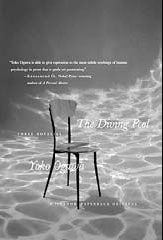Reviews
Books
The Labrador Pact
In Henry IV, Part 1, Falstaff much prefers survival (and a good breakfast) to honor and duty: "What is that word honor? ... Who hath it? He that died o' Wednesday. Doth he feel it? No." The demands of virtue are also a problem for Prince, the canine narrator of Haig's curiously affecting take on Henry, which tells the story of a loyal Labrador's efforts to hold his human family together. If only he follows the pact of his breed, Prince tells himself, he can save these people from themselves - from "all their lies and tensions and betrayals and injustices." His friend Falstaff, a chubby mixed-breed he meets in the park, begs to differ. "Duty schmooty," he bays (or how ever fictional dogs utter their dialogue) when faced with Prince's insistence on "duty over all." Dark, comic and quite brilliantly adult, Haig's thinking animals never stray into the sickly sweet zone. As the duplicities mount (among both species), Prince's Labrador dogma proves inadequate to the task: "Whereas dogs can learn to suppress their instincts," he realizes, "for humans there is no hope."
The Diving Pool: Three Novellas

By Yoko Ogawa (Picador, paper)
Still waters run dark in these bright yet eerie novellas, whose crisp, almost guileless prose hides unexpected menace. In the title story, Aya, a high school student, is obsessed with the graceful body of a young diving enthusiast and the suffering of a child on whom she unleashes a strangely calm cruelty: "I wanted to savor every one of Rie's tears, to run my tongue over the damp, festering, vulnerable places in her heart and open the wounds even wider." Another novella is the perplexing account of two sisters, one apparently keeping a record of the other's pregnancy. At first, the mother-to-be seems the more troubled, with her bizarre cravings and visits to a psychiatrist. Then again, perhaps it's the diarist we should be keeping an eye on. In the final novella, a lonely woman helps settle her young cousin into her old college residence, which has fallen into disrepair since the unexplained disappearance of a student. This nameless narrator can't stay away from the dorm or its spooky manager, who is missing a leg and both arms and says he is dying. She begins visiting every day, only belatedly wondering why her cousin never seems to be around. Stephen Snyder's elegant translations from the Japanese whet the appetite for more.
Dervishes
By Beth Helms (Picador, paper)
Secrets and lies swirl around the characters in this first novel like the heat and dust of 1970s Ankara, which Helms evokes so well. Grace and her 12-year-old daughter, Canada, are part of the embassy set, adrift in a country with which they never really connect. This sense of dislocation seems to have its roots in the mysterious work of Grace's husband, who is frequently called away on clandestine missions to unknown destinations. The novel opens with just such a summons, but this is one from which Canada's father will not return. Helms then rewinds to recount the period leading up to that late-night phone call. For mother and daughter, it's a time of unraveling: Grace makes bad judgment calls and has an affair with Canada's riding instructor, while her daughter, who is both a corrupting and a corruptible child, tries to raise herself. As Helms deftly maps the damage these two have wrought on themselves and those around them, Canada wonders how they will cope: "How would we live outside the close and sheltering world we'd always bucked against, but always known? We would be suddenly, in all ways, unmoored, ill equipped, stark naked." New York Times Syndicate
(China Daily 03/19/2008 page20)














